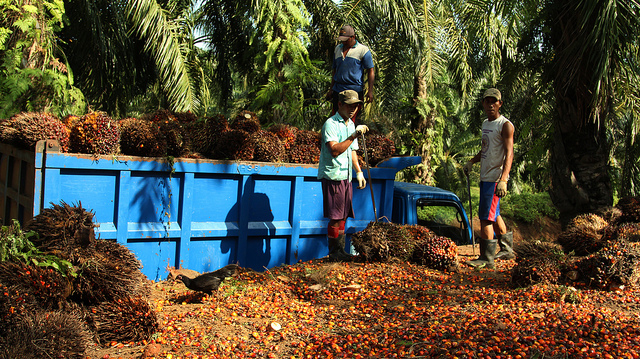By: Kafil Yamin
Send to a friend
The details you provide on this page will not be used to send unsolicited email, and will not be sold to a 3rd party. See privacy policy.
[JAKARTA] Nordic pension funds are indirectly supporting Indonesia’s environmentally destructive palm oil industry, a new report claims, putting into question the reputation of Norway and Sweden as global leaders in the fight against deforestation.
According to the report, the Norwegian Government Pension Fund Global (GPFG), the bank Nordea and the Swedish public pension fund AP-fonderna own shares in six South-East Asian banks that have financed palm oil operations and which “adopt a scorched earth approach to palm oil production”.
The report, published 30 May by the Rainforest Foundation Norway and the Fair Finance Guide, shows Norwegian investments in four of Indonesia’s largest banks — Bank Mandiri, Bank Rakyat Indonesia, Bank Negara Indonesia and Bank Central Asia, all of them supporting palm oil production and have extended US$12.5 billion in outstanding loans.
GPFG’s US$1.3 billion investments to the four Indonesian banks contradict Norway’s provision of US$1 billion for forest conservation to help Indonesia achieve CO² emissions cut by 26 per cent by 2020 through the Reducing Emissions from Deforestation and Forest Degradation or REDD.
The Scandinavians are not alone in financing environmentally unsustainable oil palm cultivation in Indonesia.
A study by Greenpeace-Indonesia, released in January, disclosed that the London-based HSBC had invested US$16.3 billion in ‘problematic’ oil palm companies like Bumi Utama, Karya Bakti Agro, Goodhope, Henrison Inti Persada, Bio Inti Agrindo and Indofood.
However, local experts turned the tables and blamed the foreign NGOs for false reports which they say are aimed at discrediting the oil palm industry and extracting money by posing as consultants to firms they criticise.
“Oil palm companies are vulnerable to complaints (they can be expelled from RSPO and their bank credit cancelled) because the RSPO is unable to assess complaints made by NGOs.”
Iwan Setiawan, Aksenta
Iwan Setiawan, conservation consultant at the Jakarta-based environment management firm Aksenta, says NGOs can discredit oil palm companies by merely posting unsubstantiated charges on the website of the Roundtable on Sustainable Palm Oil (RSPO), the multi-stakeholder initiative that certifies sustainable palm oil cultivation, and they use this power to extort money.
“Oil palm companies are vulnerable to complaints (they can be expelled from RSPO and their bank credit cancelled) because the RSPO is unable to assess complaints made by NGOs,” Iwan explains. “Then some NGOs act like consultants (through their advocacy). They do research and make recommendations, for which they are paid.”
An executive of a palm oil company, who ask for anonymity, tells SciDev.Net: “The projects they have proposed are often remarkably high-budget. Worse, many of them have not worked. Aborted conservation projects have left more forest areas abandoned and they have become more vulnerable to poaching, trespassing and illegal logging.”
Indonesia and Malaysia are the world’s top palm oil producers accounting for a combined 85per cent of the world’s supply. Banks are vital to the industry’s expansion as it needs to borrow funds to establish oil palm estates.
A European resolution (4 April 2017) on palm oil and deforestation concluded on the possibility of controlling palm oil imports in an effort to control deforestation in South-East Asia.A November 2015 report by the independent Environmental Investigation Agency (EIA), London, charged the RSPO with “woefully substandard assessments” and said there was evidence of “collusion with plantation companies to disguise violations of the RSPO standard”.
Case studies in the EIA report showed RSPO auditors complicit in greenwashing, ambiguous legal compliance and conflicts of interest due to links between certification bodies and plantation companies.
This piece was produced by SciDev.Net’s Asia & Pacific desk.














